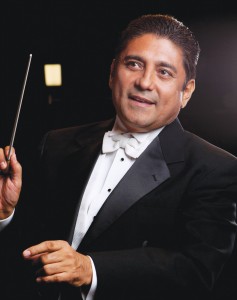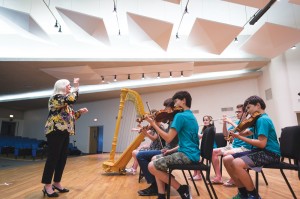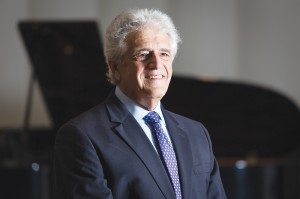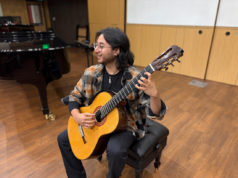
Since 2000, FWYO’s music director and conductor has been German Gutierrez. The director of orchestral studies at TCU and Dallas Symphony Orchestra guest conductor has overseen every level of the program, from the beginner Suzuki strings program to the top-tier Youth Orchestra. Under his leadership, the orchestra has grown from 80 to 105 musicians and has toured Italy, Austria, and Japan.
Dunleavy and several other insiders I spoke with say that the orchestra is so successful because of Gutierrez’s strict but evenhanded approach to discipline and, frankly, his good taste in challenging repertoire.
As we sat in his office, surrounded by dozens of concert posters and photos, he showed me a card that his students had signed, thanking him for the recent season. The phrases “best time of my life” and “greatest moment ever” were used a lot.
“I tell you this is better than a paycheck,” he said, his eyes noticeably lit with glee.
His No. 1 responsibility, he said, is “to get the best result at every performance.”
When he started, that wasn’t necessarily the case.
“There were a lot of problems with discipline,” he recalled. “Many of the kids were laughing and talking. I’d stop to call attention to them, and they’d continue.”
The bass section proved especially impossible to work with at times. After several warnings, the conductor took them outside and into an adjoining hall.
“I told them this was their last warning,” he said. “ ‘One more outburst, and you are out of the program entirely.’ ”
The reaction from the students and their parents wasn’t surprising. At the next rehearsal, only three of the original 12 bass players returned. Part of the misunderstanding was cultural, Gutierrez admitted. When the Colombia native came to the United States 20 years earlier, he was surprised to find an education system that over-praised students even when they hadn’t earned it and teachers who were often afraid to say anything critical.
“I grew up in a system where we really had to work for an A,” he said. “Nothing was guaranteed.”
Word eventually reached the organization’s board of directors. The maestro explained that the students needed to learn respect or a high quality orchestra would not be possible.
The board sided with its new conductor. A few of the banished bass players returned the following season, and years later several of them wrote Gutierrez to thank him for the life lesson. That lesson, the conductor said, had nothing to do with music. It was about responsibility and being respectful.
The first hurdle was over. The second would have everything to do with music.
“It took some time to bring the Youth Orchestra to the level it is at now,” Gutierrez said. “When I took over, the program wasn’t producing musicians who were capable of majoring in music at TCU. This year, we have 10 students going to TCU or UNT. Most of the wind players in the TCU orchestra came from the Youth Orchestra. It is beautiful to see them grow from the time they are 12 and then go off to college.”
Raising the artistic quality of the youth orchestra meant choosing repertoire that was challenging enough to push the young musicians but not so hard as to leave them without a viable program for concerts. As in the past, every FWYO ensemble performs several times a year, at Orchestra Hall, churches, or concert halls. Or overseas.
When Gutierrez took over the program, the students were playing repertoire that had popular appeal with audiences, but the pieces weren’t technically demanding. Pushing teenagers to master difficult passages of works by Beethoven, Tchaikovsky, and others is time consuming, Gutierrez said. He often asks sections of the orchestra to work on specific measures at home. If a musician is unable to properly execute a specific passage, Gutierrez will ask him or her to sit out that section and enter later. It’s nothing personal, he tells his students. Even professional musicians have difficulty with some of these passages.
******

A 1992 letter written by FWYO founding director Betty Utter best describes the youth orchestra’s origins.
“It was exactly 30 years ago this month that I went to see Robert Alexander, manager of the Fort Worth Symphony [Orchestra], and ask him why we did not have a youth orchestra,” she writes. “He said that it seemed like a good idea, but he didn’t really have the time to explore it. [He asked] if I would like to see if there was any interest. I answered, ‘Sure!’ The rest is history, as they say.”
The rest is actually far more work than the letter implies. In 1965, Utter put together a small but enthusiastic group of volunteers who, under the guidance of FWSO’s then-conductor, Ezra Rachlin, officially founded the Youth Orchestra of Greater Fort Worth. But the new program needed a full-time conductor. Rachlin, who was overseeing three orchestras at the time, knew he didn’t have the time or resources to afford the project the time and resources he felt it deserved. In 1966, he asked a little known 29-year-old composer and saxophonist with limited conducting experience to fill the position.
The offer came with the understanding that Rachlin would provide John Giordano with private conducting lessons. The offer was the first but not the last that Giordano would accept in Fort Worth. From 1972 until 2000, the 77-year-old native Fort Worthian served as maestro of the FWSO, and since 1973 he has been jury chairman of the Van Cliburn International Piano Competition.
The FWYO’s first concert was at the W.E. Scott Theatre in the Cultural District.
“We had 35 very good young musicians,” Giordano said, “but the small size meant we were limited. When we learned about a festival in Switzerland, we applied through a taped performance.”
In 1969, the festival directors chose the youth orchestra, only one of three from the United States, with others from Europe and Canada. The youngest musician to take the trip to Switzerland that year was an 11-year-old girl. Elisabeth Adkins would eventually go on to become a violin soloist and associate concertmaster of the National Symphony Orchestra in Washington, D.C. Last year, she was hired onto the music faculty at TCU, a return, she said, that has deep meaning to her.

As we sat in a conference room on campus (her office was occupied by a practicing student), she recounted the role that the fledgling youth program played in her career. She was living in Denton at the time. The principal cellist for the FWSO, Harriet Woldt, heard Adkins performing a solo at a student contest. Woldt knew Giordano was looking for youth orchestra members and connected the two.
“So they called us up, and six weeks later I was in Switzerland with the orchestra,” Adkins said. “So it was really a baptism by fire. They could always find me because my feet hadn’t hit the floor yet.”
That festival, Giordano said, beefed up the youth program’s profile –– and membership.
“We committed from the beginning to only play the greatest music, no watered-down arrangements,” he said.
The skills learned from participating in the youth orchestra spill over into every aspect of these kids’ lives, he added: “We have students who’ve gone on to become doctors. One former musician is a retired Air Force General. Our students are consistently in the top percentage of their class.”
It wasn’t until she had become a young woman that Adkins truly began to grasp the scope of her FWYO training.
“Unlike many of my classmates, by the time I got to college, I had already been in leadership positions,” she said. “I had played most of the literature I needed to play, and when I joined the National Symphony, there was hardly anything we played that I hadn’t been exposed to.”
The fact is, she said, most students will pursue careers outside of classical music. But the “enlightened audience” that the youth orchestra is creating, she said, is an invaluable component of the overall arts picture in Fort Worth.
Her two teenage children –– Gregory Newman and Cecily Newman –– make up the second generation of Adkins family members to perform in the youth orchestra.
******












I thought it’d be nice if past musicians and parents would share their favorite stories/reminiscences in the comment section.
Sure, Eddie!
I am a YO alum, 1983-1987. Fort Worth Youth Orchestra was absolutely transformative for me– I had opportunities to play the music I loved with a group of like-minded and super talented kids.
Best of all, though, was the UK tour in 1987. It was delayed a year because of terrorism worries, so we had two years of anticipation. It was well worth the fundraising, the practicing, and all the rest of the preparation– close to 30 years later (!), I still tell stories from that trip.
Thanks Robin. Hope you’re having a great summer!
Sure, Eddie!
I am a YO alum, 1983-1987. Fort Worth Youth Orchestra was absolutely transformative for me– I had opportunities to play the music I loved with a group of like-minded and super talented kids.
Best of all, though, was the UK tour in 1987. It was delayed a year because of terrorism worries, so we had two years of anticipation. It was well worth the fundraising, the practicing, and all the rest of the preparation– close to 30 years later, I still tell stories from that trip.